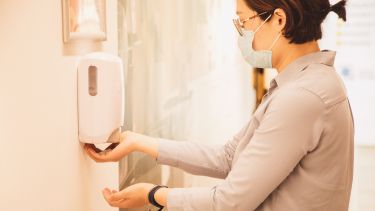- New research from the Universities of 91÷±≤• and Leeds could improve hand hygiene in office settings using new ‚Äòsmart‚Äô hand sanitisers
- Developed by British hand hygiene technology company, Savortex, the smart sanitisers can provide real-time data on how often people use them, send reminders to staff to sanitise their hands and help companies refill sanitisers more effectively
- Partnership shows how research can quickly develop new solutions for battling the pandemic
- Good hand hygiene is a proven, effective method for preventing the spreading of viruses including Covid-19
'Smart' hand sanitisers that can provide data on workplace hand hygiene are being trialled across the country, as part of research by the Universities of 91÷±≤• and Leeds into how best to engage people with the latest Covid-19 workplace hand hygiene guidance.
The new technology can grab the attention of the users with integrated video screens to display the latest workplace hand hygiene guidance and provide valuable real-time data for employers to use in their fight against Covid-19.
Developed by hand hygiene technology company Savortex, the sanitisers can monitor in real-time how often, or not, they are used, with some able to send reminders to staff to sanitise their hands, or restrict building access for those that haven’t. They could also help companies work more sustainably by being able to schedule refilling of the sanitisers more effectively.
Using the data from the trials, the researchers from the Universities of 91÷±≤• and Leeds will analyse their effectiveness, how people feel about integrating smart technologies into their working life, their attitude to workplace health and safety guidance, and help employers ensure the best use of the sanitisers in various environments.
As the evolving Covid-19 pandemic has not only changed how people live and work, it is also changing attitudes to the most benign day-to-day interactions, like shaking hands, or reaching for the door handle of a public building. Understandably many people are now weary of returning to busy office spaces and workplaces where there may be an increased risk of transmission.
Good hand hygiene is vital to stopping the spread of infection in environments like office spaces, where humans mix in close contact, regularly touching surfaces that could be potentially contaminated, like door handles and taps.
As the recognised approach to infection prevention worldwide, not just to minimise their risk of catching the Covid-19 virus, studies show good hand hygiene can reduce the risk of contracting a respiratory virus by 55 per cent¹, or reduce it to five times less for health workers.²
Dr Sophie Rutter from the University of 91÷±≤•‚Äôs Information School, said: ‚ÄúIn many sectors, such as healthcare, staff are compelled as part of their job to clean their hands regularly for obvious reasons of patient safety, but as we don‚Äôt really know what motivates people to wash their hands in office spaces, it can be difficult and expensive for employers to run health and safety campaigns to encourage people to follow health and safety guidance.
“We know good hand hygiene is effective at stopping transmission of Covid-19, so this project will help us find solutions to ensure office environments are safe and clean, and play their part to stop the spread of Covid-19.”
Dr Sophie Rutter
The data generated by something as simple as a smart hand sanitiser may seem extreme to some, but Dr Rutter believes, also necessary in supporting workplaces to minimise the risks of colleagues transmitting the virus to each other.
She added: “It is so important that people adopt the highest hand hygiene standards if we are to reduce the impact of Covid-19 on our daily lives, so empowering employers to create a healthy and safe environment for everyone is not only necessary, it will also improve the wellbeing of all by reducing the risk of virus transmission in our workplaces.”
Nicholas Gill from Savortex, said: “The research previously done by the universities into how the right messaging could help school children improve their hand washing, inspired us to see how we could use our technology to battle the pandemic by encouraging best-practice in hand hygiene in the workplace.
“The pandemic has been the catalyst for rapid development of new and novel solutions to help stop the spread of Covid-19 and empower companies to take control of hygiene management and staff wellbeing. This not only reassures people returning to work that they are in a safe and secure environment, but can also help companies work smarter and more sustainably to keep their staff safe.”
The trials will start in a variety of office locations in the spring, including government departments and corporate head offices. Companies that would like to enquire about taking part in the research project as a trial site can contact Nicholas Gill at Savortex on +44 (0) 7767 760290, or at nicholas.gill@savortex.co.uk
Additional Information
- The research project and trial received a funding award of £570,000 from Innovate UK.
- ¬π
- ²



